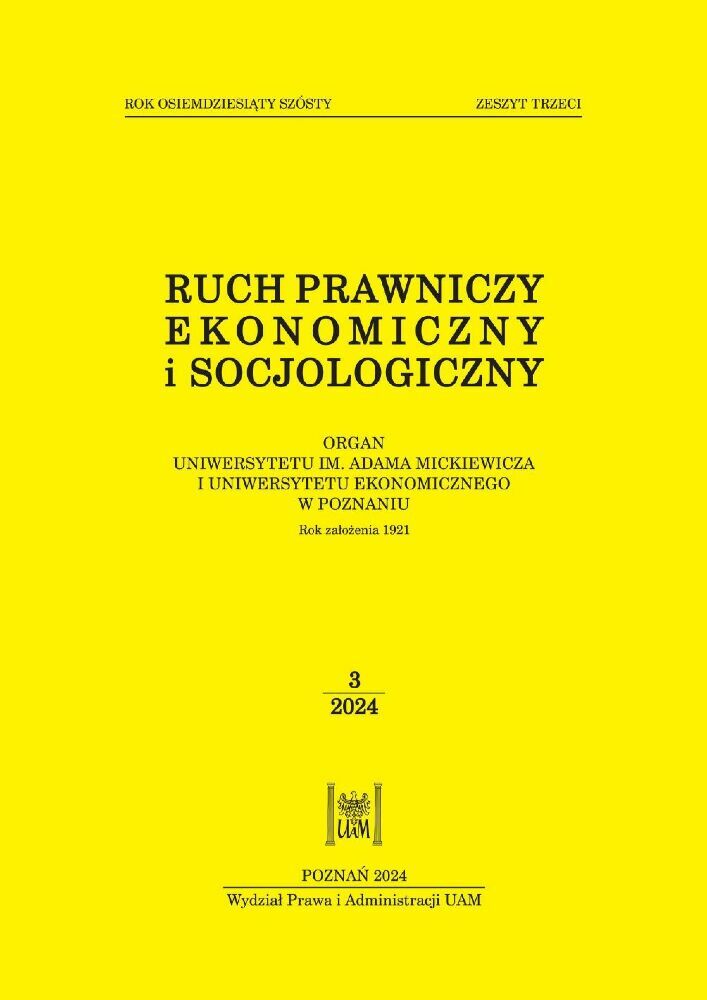Abstract
This polemic contributes to the discussion on the formal aspect of the justification of necessary (self) defence and on how the justification should be located in the normative structures of criminal law. The author, using the dogmatic-legal method with particular emphasis on the derivative concept of legal interpretation as an integrated concept, argues that the regulations on the justification of necessary (self) defence function as a modifier of the scope of the sanctioning norm. This approach to the issue of the normative placement of the justification leads the author to the conclusion that it is an expression given, by the norm-maker, to the concept of strong permission, which is an operator in deontic logic. This present study rejects the thesis that the provision on the justification of necessary (self) defence constitutes the modifier of the scope of application of the prohibition of the norm. This means that conduct performed in justification conditions meets the criteria of a prohibited act under penalty, and this entails that it is conduct capable of transgressing the sanctioned norms of criminal law. The occurrence of this situation prevents the sanctioning norm from being actualized. A different approach leads to a situation in which normative content is redundant in the legal text and is also inconsistent with the prohibition of synonymous interpretation.
References
Asher, N., i Bonevac, D. (2005). Free choice permission is strong permission. Synthese, 145, 303–323. DOI: https://doi.org/10.1007/s11229-005-6196-z
Andrejew, I. (1959), Ustawowe znamiona przestępstwa. Wydawnictwo Prawnicze.
Andrejew, I. (1978). Ustawowe znamiona czynu. Typizacja i kwalifikacja przestępstw. Wydawnictwo Prawnicze.
Governatori, G., Olivieri, F., Rotolo, A., i Scannapieco, S. (2013). Computing strong and weak permissions in defeasible logic. Journal of Philosophical Logic, 42(6), 1–37. DOI: https://doi.org/10.1007/s10992-013-9295-1
Iwański, M., Małecki, M., Tarapata, S., i Zontek, W. (2020). Dlaczego rozważania o „aspekcie formalnym kontratypu obrony koniecznej” są bezprzedmiotowe (na marginesie artykułu Kamila Siwka). Przegląd Sądowy, 11–12, 135–142.
Kelsen, H. (2014). Czysta teoria prawa (R. Szubert, tłum.). LexisNexis Polska.
Kmita, J. (1973). Wykłady z logiki i metodologii nauk. Wydawnictwo PWN.
Pohl, Ł. (2007). Struktura normy sankcjonowanej w prawie karnym. Wydawnictwo Naukowe UAM.
Popper, K. R. (2002). Logika odkrycia naukowego (U. Niklas, tłum.). Fundacja Aletheia.
Roy, O., i Kulicki, P. (2020). Legal permissibility and legal competences in hierarchical systems with strong permission. Journal of Zhejiang University, 5, 51–62. https://www.zjujournals.com/soc/EN/Y2020/V6/I5/30
Siwek, K. (2020). Aspekt formalny kontratypu obrony koniecznej. Przegląd Sądowy, 5, 81–98.
Siwek, K. (2022). Jeszcze o aspekcie formalnym kontratypu obrony koniecznej. Ruch Prawniczy, Ekonomiczny i Socjologiczny, 84(3), 241–253. DOI: https://doi.org/10.14746/rpeis.2022.84.3.15
Trypuz, R. (2008). „Setna” – prosta teoria norm i działania. Filozofia Nauki, 16(3–4), 155–175. https://www.fn.uw.edu.pl/index.php/fn/article/view/553
Wolter, W. (1963). O kontratypach i braku społecznej szkodliwości czynu. Państwo i Prawo, 18(10), 502–511.
Wright, G. H. von (1977). Norm and action: A logical enquiry. Routledge and Kegan Paul.
Zieliński, M. (1972). Interpretacja jako proces dekodowania tekstu prawnego. Wydawnictwo Naukowe UAM.
Zieliński, M. (1998). Wyznaczniki reguł wykładni prawa. Ruch Prawniczy, Ekonomiczny i Socjologiczny, 60(3–4), 1–20. http://hdl.handle.net/10593/5446
Zieliński, M. (2006). Derywacyjna koncepcja wykładni prawa jako koncepcja zintegrowana. Ruch Prawniczy, Ekonomiczny i Socjologiczny, 68(3), 93–101. http://hdl.handle.net/10593/6373
Zieliński, M. (2017). Wykładnia prawa. Zasady – reguły – wskazówki. Wolters Kluwer.
Zieliński, M. (2021). Komentarz do § 10. W: M. Zieliński i S. Wronkowska, Komentarz do Zasad Techniki Prawodawczej z dnia 20 czerwca 2002 r. (s. 42–43). Wydawnictwo Sejmowe.
Ziembiński, Z. (1974). Metodologiczne zagadnienia prawoznawstwa. Wydawnictwo PWN.
Ziembiński, Z., i Zieliński, M. (1992). Dyrektywy i sposób ich wypowiadania. Polskie Wydawnictwo Semiotyczne.
Zirk-Sadowski, M. (1986). Uprawnienie a problem funkcji tzw. języka prawnego. Acta Universitatis Lodziensis Folia Iuridica, 24, 37–51.
License
Copyright (c) 2024 WPiA UAM

This work is licensed under a Creative Commons Attribution 4.0 International License.





